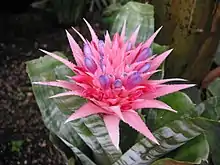Aechmea fasciata
Aechmea fasciata is a species of flowering plant in the Bromeliaceae family.[2] It is commonly called the silver vase or urn plant and is native to Brazil. This plant is probably the best known species in this genus, and it is often grown as a houseplant in temperate areas.
| Aechmea fasciata | |
|---|---|
 | |
| Scientific classification | |
| Kingdom: | Plantae |
| Clade: | Tracheophytes |
| Clade: | Angiosperms |
| Clade: | Monocots |
| Clade: | Commelinids |
| Order: | Poales |
| Family: | Bromeliaceae |
| Genus: | Aechmea |
| Subgenus: | Aechmea subg. Platyaechmea |
| Species: | A. fasciata |
| Binomial name | |
| Aechmea fasciata | |
| Synonyms | |
|
Aechmea fasciata var. flavivittata Reitz | |
Habit
The plant grows slowly, reaching 30–90 cm (12–35 in) in height, with a spread of up to 60 cm (24 in). It has elliptic–oval-shaped leaves 45–90 cm (18–35 in) long and arranged in a basal rosette pattern.[3]
Growing conditions
Aechmea fasciata requires partial shade and a well-drained, but moisture-retentive soil. It can also be grown epiphytically, as, for example, with moss around its roots and wired to rough bark. Root rot can be a problem if the soil is too moist.[3]
Scale insects and mosquitos will sometimes breed in the pools of water that are trapped between the leaves.[3]
Toxicity
Aechmea fasciata is listed in the FDA Poisonous Plant Database under the section for "Skin irritating substances in plants" and is known to cause contact dermititis, phytophoto dermatitis, and contact allergy.[4]
Cultivars
|
|
|
References
- "Aechmea fasciata". Integrated Taxonomic Information System. Retrieved 26 October 2012.
- "Aechmea fasciata (Lindl.) Baker". Plants of the World Online. The Trustees of the Royal Botanic Gardens, Kew. n.d. Retrieved July 22, 2020.
- Gilman, Edward F. (October 1999). Aechmea fasciata (PDF) (Report). University of Florida Cooperative Extension Service. Retrieved 2009-11-09.
- "FDA Poisonous Plant Database". U.S. Food and Drug Administration. Retrieved 21 July 2014.
- BROMELIACEAE DA MATA ATLÂNTICA BRASILEIRA retrieved 22 October 2009
- BSI Cultivar Registry Retrieved 11 October 2009
External links
| Wikimedia Commons has media related to Aechmea fasciata. |
- "Silver Vase (Aechmea fasciata)". Desert-Tropicals. Archived from the original on 23 December 2009. Retrieved 2009-11-09.
- "Aechmea fasciata (Lindl.) Baker urnplant". PLANTS Profile. USDA Natural Resources Conservation Service. Retrieved 26 October 2012.